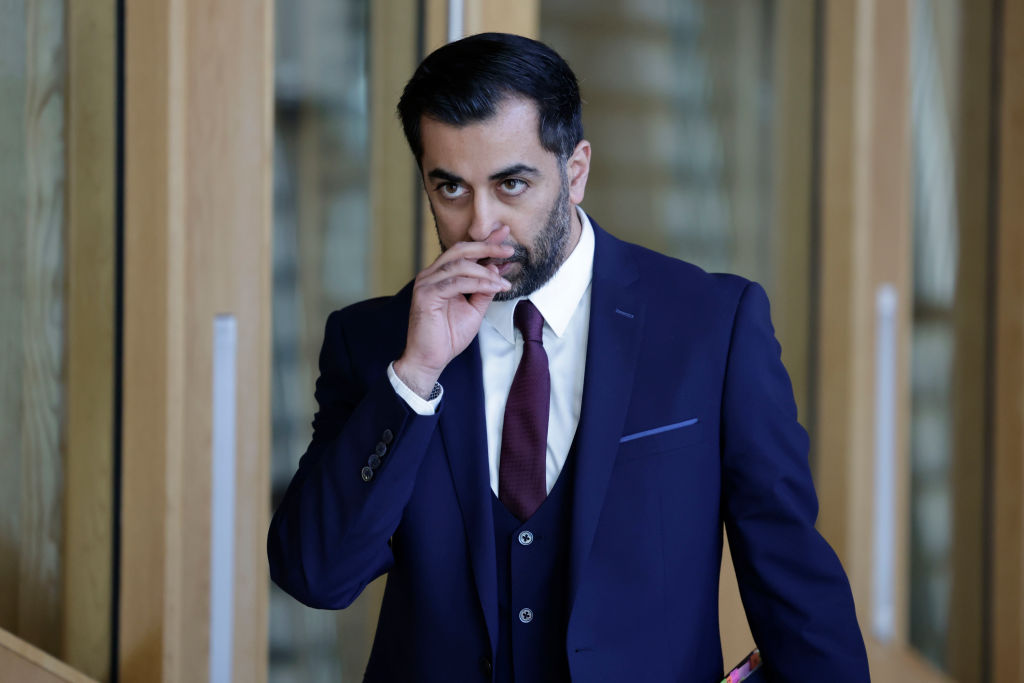Any uncertainty about the extent of the damage inflicted on the SNP by the criminal investigation into party finances can be safely disregarded. An extensive poll by YouGov suggests that those scenes of a police forensics tent outside Nicola Sturgeon’s Glasgow home, and the arrest of her husband, the SNP chief executive, Peter Murrell, have done lasting damage in the SNP heartland.
According to this survey of 3,500 Scots, conducted in April and May, the Nationalists stand to lose 21 of their 48 MPs in the next general election – including nearly all their Glasgow seats. Labour would return 24 seats across Scotland, up from only one. This could be enough to put Keir Starmer in No. 10 with a majority and pitch Humza Yousaf out of Bute House in a palace coup. It would be the 2015 election tsunami in reverse.
YouGov’s assessment is unambiguous: ‘accusations of party mismanagement and potential criminal cases being brought against senior officials have taken a serious toll’. Chief executive Murrell and the party’s treasurer Colin Beattie were released without charge but the criminal investigation continues on – supervised by the National Crime Agency, the UK force that deals with serious and organised crime. Nicola Sturgeon has yet to be asked to help police with their inquiries, but this bewildering crisis shows no sign of an early resolution. Police Scotland aren’t backing down, despite criticism from key figures like former spin-doctor Murray Foote that the whole affair is a ‘wild goose chase’.
The polling figures are a further blow to a party that still can’t quite believe what has happened to it in the few short months since Sturgeon resigned. The SNP has been rocked by resignations, divisions over policy and doubts about the integrity of the leadership election that installed Humza Yousaf. And there appears to be very little prospect of recovery under the politician who replaced the SNP’s most electorally successful leader.
The SNP has been rocked by resignations, divisions over policy and doubts about the integrity of the leadership election that installed Humza Yousaf.
Well, no one said it was going to be easy. Everything that could go wrong for Humza Yousaf has gone wrong since he took over in April. The scandal over missing party funds rumbles on, even if the arrests haven’t; the First Minister is now being criticised for failing to deal with a new ‘sex pest’ scandal that has wrecked the SNP group in North Lanarkshire, and to cap it all he faces the possibility of an SNP by-election defeat after former SNP MP Margaret Ferrier’s suspension from parliament.
As if that weren’t enough, the Scottish government faces large compensation claims from businesses over the ill-fated deposit return scheme for bottles and cans which looks likely to be scrapped as early as next week. Over at Ferguson Marine, the wellbeing economy minister Neil Gray has decided to press ahead with building a ferry, ‘Hull 802’, despite admissions that it is not ‘value for money’. The health service is ‘broken‘ in large parts of the country according to Scotland’s BMA chairman and to add insult to injury, Yousaf is threatening to roll out a new round of tax increases in the middle of a cost of living crisis.
But fear not, because the party is about to ‘come together’ this summer in a kind of festival of independence starting with the SNP’s convention in Dundee at the end of June. Humza Yousaf has promised to ‘harness the energy’ of SNP members, convene ‘regional assemblies’ across Scotland and produce new policy papers on the merits of independence. This is all to build the campaign for the independence referendum that, er, everyone knows is not going to happen. Yousaf has himself suggested during his leadership campaign that Indyref2 isn’t coming any time soon.
Net Zero minister Màiri McAllan MSP suggested on Question Time last week that a second independence referendum would only come when support for independence was near 60 per cent in the polls. That seems to be the new definition of the ‘settled will’ of the Scottish people. But if so, we are a long way from that, even though support for independence is still relatively high. And I’m not quite sure the hard line nationalists accept that 60 per cent should be the benchmark.
What will occupy much of the time in Dundee will be questions about the conduct of the leadership in the months since Sturgeon resigned. To say the roof has fallen in would be an insult to demolition: the SNP government just can’t seem to get anything right. Gender reform, recycling, waiting lists, ferries… the list seems inexhaustible.
There will also be talk about the plan to scrap juries for rape trials in Humza Yousaf’s draft Victims, Witnesses and Justice Reform Bill, which appears to have united the entire legal profession against what defence lawyers believe is an assault on the cornerstone of our justice system. It has not gone without notice in the SNP that Alex Salmond was acquitted of 13 charges of sexual assault and attempted rape in 2020.
Salmond has been a trenchant critic of the failures of the Scottish government under both Sturgeon and Yousaf. He is also the leader who took the SNP to its first election victory in 2007, to its first landslide election win in 2011 and to its first independence referendum in 2014. Is he deluded in thinking his time has come again? One thing’s for sure: the nationalists desperately want a winner – and Yousaf doesn’t quite fit the bill.







Comments